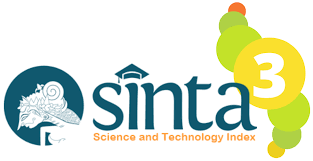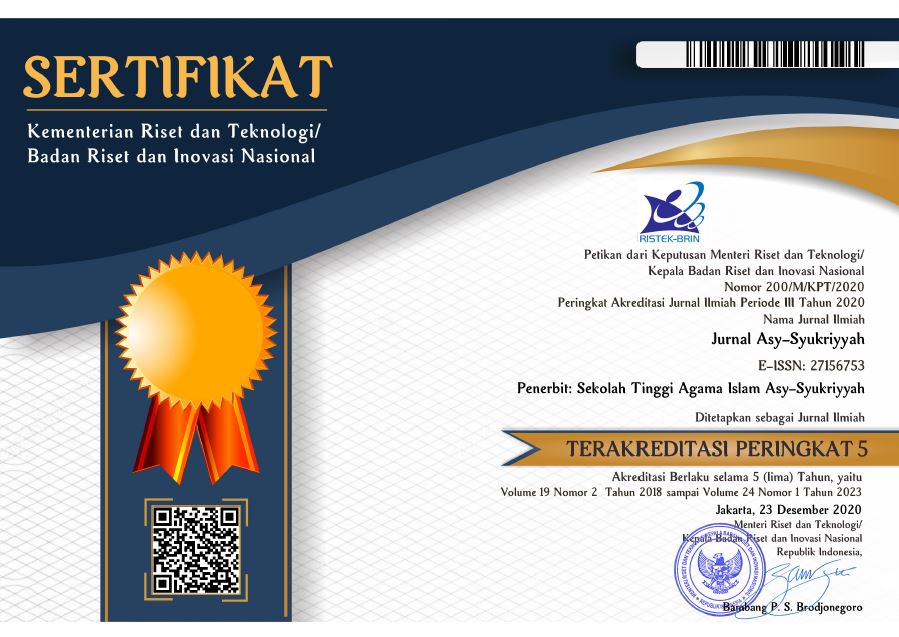PERAN PENDIDIKAN ISLAM DALAM MEMBENTUK KARAKTER SISWA BERDASARKAN PERSPEKSTIF FILSAFAT PERENIALISME
DOI:
https://doi.org/10.36769/asy.v24i1.334Keywords:
Islamic education, character, student character, perennialist philosophyAbstract
The purpose of this study is to determine the role of Islamic education in shaping the character of elementary school students based on their inherent nature, in accordance with the perspective of perennialist philosophy. This research uses qualitative techniques with descriptive methods, based on the results of interviews, observations, and documentation at MI Hidayatul Istiqomah. MI Hidayatul Istiqomah is a school that implements the national curriculum by integrating Islamic teachings to respond to the challenges of the times and prepare students to pursue higher education. The findings of this study indicate that MI Hidayatul Istiqomah has a vision and mission that are aligned with the objectives of the madrasa to educate students' character based on their nature through the school curriculum adopting noble values that are still relevant today supported by the teacher's role in providing exemplary, and fostering Islamic culture. which upholds the moral values of students.
References
Abidin, Zainal. “Perspektif Pendidikan Islam Terhadap Filsafat Perenialisme.” Jurnal Nizham 3, no. 02 (2014): 159–78.
Al-Qur’an, n.d.
Fitriah, Dhia, and Meggie Ullyah Mirianda. “Kesiapan Guru Dalam Menghadapi Tantangan Pendidikan Berbasis Teknologi.” Prosiding Seminar Nasional Pendidikan Program Pascasarjana Universitas Pgri, 2019, 148–53.
Hidayat, Komaruddin, and Muhammad Wahyuni Nafis. Agama Masa Depan Perspektif Filsafat Perenial. Jakarta: Gramedia Pustaka Utama, 2003.
Ilham, Dodi. “Persoalan-Persoalan Pendidikan Dalam Kajian Filsafat Pendidikan Islam.” Didaktika 9, no. 2 (2020). https://jurnaldidaktika.org/179.
Irmania, Ester, Anita Trisiana, and Calista Salsabila. “Upaya Mengatasi Pengaruh Negatif Budaya Asing Terhadap Generasi Muda Di Indonesia.” Jurnal Dinamika Sosial Budaya 23, no. 1 (2021): 148–60. https://doi.org/10.26623/jdsb.v21i2.1698.
Musyirifin, Zaen. “Implementasi Sifat-Sifat Rasulullah Dalam Konseling Behavioral.” Al - Irsyad : Jurnal Bimbingan Konseling Islam 11, no. 2 (2020): 151–59. https://doi.org/https://doi.org/10.15548/jbki.v11i2.2088.
Nabila. “Tujuan Pendidikan Islam.” Jurnal Pendidikan Indonesia 5, no. 2 (2021): 867–75. https://doi.org/https://doi.org/10.59141/japendi.v2i05.170.
Naisabury, Imam Abi al Husain Muslim bin al Hajjaaj al Qusairy al. Shahih Muslim. Juz II., n.d.
Ningsih, Tutuk. “Peran Pendidikan Islam Dalam Membentuk Karakter Siswa Di Era Revolosi Industri 4.0 Di Madrasah Tsanawiyah Negeri 1 Banyumas.” INSANIA : Jurnal Pemikiran Alternatif Kependidikan 24, no. 2 (2019): 220–31. https://doi.org/10.24090/insania.v24i2.3049.
Sari, Nopi, and Nur Arifah Hanafiah. “Manajemen Pendidikan Dalam Upaya Pembentukan Karakter.” IEMJ: Islamic Education Managemen Journal 1, no. 2 (2022): 13–25. https://www.journal.staialmaarifwaykanan.ac.id/index.php/iemj/article/view/126.
Sari, Nurratri Kurnia, and Linda Dian Puspita. “Implementasi Pendidikan Karakter Di Sekolah Dasar.” Jurnal Dikdas Bantara 2, no. 1 (2019): 57–72. https://doi.org/https://doi.org/10.32585/jdb.v2i1.182.
Shinta, Mutiara, and Siti Quratul Ain. “Strategi Sekolah Dalam Membentuk Karakter Siswa Di Sekolah Dasar.” Jurnal Basicedu 5, no. 5 (2021): 4045–52. https://doi.org/10.31004/basicedu.v5i5.1507.
Warisno., Andi. “Standar Pengelolaan Pendidikan Dalam Mencapai Tujuan Pendidikan Islam.” An Nida 1, no. 1 (2021): 1–8.
Zuhairini, and Dkk. Filsafat Pendidikan Islam. Jakarta: Bumi Aksara, 2009.
Downloads
Published
How to Cite
Issue
Section
License
Copyright (c) 2023 Ratna Liviani

This work is licensed under a Creative Commons Attribution 4.0 International License.















